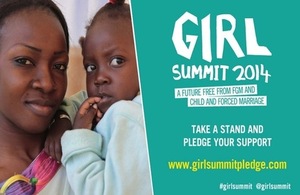DFID Press Release on Girl Summit
Enough is Enough! Together we can end Female Genital Cutting and Child, Early and Forced Marriage

Girl Summit 2014
On Tuesday 22 July the UK Government and the United Nations Children’s Fund (UNICEF) will host the Girl Summit 2014 in London. The Summit intends to intensify efforts and commitments worldwide to create a world where all girls and women can fulfil their potential, free from discrimination and violence.
Female Genital Mutilation/Cutting (FGM/C) and child, early and forced marriage (CEFM) are two harmful practices which stand in the way of this vision. The Girl Summit 2014 will build international support for inspiring local and national efforts to end FGM/C and CEFM. The Summit will bring together young people, community members, activists, traditional and faith leaders, government and international leaders, experts and champions committed to the rights and empowerment of women and girls.
Child, early and forced marriage affects millions of girls every year. One in three girls in developing countries is married by the age of 18. Some are as young as eight. Girls who marry young are at a higher risk of death during child birth. They are also likely to have fewer economic opportunities and be poor due to time and financial expenses on child care.
In Sierra Leone, 44 percent of women aged 20-24 were married or in union before they were 18 years old, according to the latest figures from UNICEF. Child marriage is a human rights violation. Girls married at an early age are usually forced into the marriage, usually to older men. This increases their vulnerability to physical, psychological, emotional, financial and sexual abuse.
Sierra Leone also has one of the highest rates of FGM/C in the world – 89.6% of women aged 15-49 are reported to have been cut.
Ending child marriage and FGM/C can preserve a girl’s childhood, promote her education, and reduce her exposure to violence and abuse, allowing her to make choices about her own future and fulfil her potential in life. It can also break intergenerational cycles of poverty and allow girls and women to more fully participate in society. Girls who have skills, education, access to economic assets and decision-making power make greater contributions to their communities and to their families. It will also lower the chances of young girls and women dying during or after childbirth, or suffering from debilitating conditions.